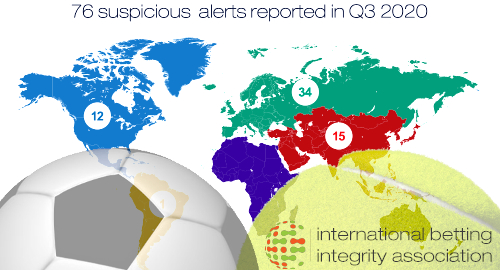 The number of suspicious sports betting alerts jumped in the third quarter of 2020 following this summer’s resumption of major league play.
The number of suspicious sports betting alerts jumped in the third quarter of 2020 following this summer’s resumption of major league play.
The latest report from the International Betting Integrity Association (IBIA) found 76 suspicious betting alerts in the three months ending September 30, up from just 50 in the same period last year. The number is also significantly higher from the 58 alerts reported in Q2 2020, during which many sports were dormant due to COVID-19.
As usual, football (soccer) and tennis led the way with 25 alerts apiece, while the pandemic focus on alternate sports led to seven alerts regarding Russian and Ukrainian table tennis matches.
The pandemic also led to 14 eSports betting alerts in Q3, but this number is likely to recede in future reports given statistics showing steep declines in eSports betting activity following the resumption of real-world sports this summer.
In geographic terms, Europe led the way in Q3 with 34 alerts, 13 of which were related to tennis and 11 for football. Russia accounted for six alerts (half football, half ping-pong), while Germany ranked second with four (all tennis) and Romania notched three tennis alerts.
Asia ranked second on the continental total with 15, of which all but two were related to football. All 12 North American alerts were related to tennis matches, while South America notched a single football alert.
For the year-to-date, the IBIA saw a total of 195 alerts, a significant step up from the 138 alerts reported over the first nine months of 2019 (but only slightly higher than the 184 in 9M 2018).
It’s worth reminding everyone that IBIA’s stats come from betting operators who, despite the claims from some of the more rabid anti-gambling types, have the most to lose from efforts to muck with sports integrity. IBIA CEO Khalid Ali said Q3’s increased number of alerts was partly attributable to the monitor adding four new members this year, including DraftKings, which announced its membership last month.